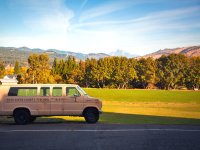A Student’s Perspective on Place-Based Learning
“All I needed during middle school was to feel a part of something, and connecting to my community brought me that.” — Grace Whitmore, Hood River Middle School alumna
Your content has been saved!
Go to My Saved Content.When I first arrived at Hood River Middle School (HRMS), I was a wide-eyed, unsure 11-year-old who had spent the last six years of my life in the security of my elementary school. Not surprisingly, the transition to middle school was abrupt. A whole new level of hands-on, interactive classes became available to me, and I barely knew where to start. I found myself wondering if I should take green building design, introduction to string instruments, or rock climbing. The school felt like a miniature world with a variety of people to meet and classes to experience. I spent the next three years of my life exploring this world, and through placed-based learning, I grew significantly as a person.
The Local Connection
When I look back on my days at HRMS, my most vivid memories were from the time spent outside of the classroom. The Stream Survey project in eighth grade was especially memorable. My science class could have done online research to find stream data for our research report, but we didn't. Most days in class, I walked down to nearby Culvert Creek to collect my own data. I observed how the surrounding neighborhood affected the creek health, and talked to residents about why they enjoy living near the creek. Simple enough, this was a classic example of learning by doing in the community. And as someone still in the public school system -- a high school sophomore -- I can tell you that it works. With place-based learning, this simple connection from student to creek to neighborhood brought me a sense of cause and effect that I never quite found in a textbook. My schooling at HRMS was full of local connections, including collaborations with community partners. Community music leaders guest-taught our band classes, a plant scientist showed me how to prune trees, and my literacy class read stories to the nearby elementary school. Connections were important to me. All I needed during middle school was to feel a part of something, and connecting to my community brought me that.
Building Up, Taking Care
Through the Food and Conservation Science (FACS) Program, my peers and I had the chance to collaborate on different outdoor projects. I helped design and build a fish tank system to bring nitrogen to plants. I learned how to bake a killer pumpkin pie from homegrown pumpkins. I grew a plot of eggplants and attempted to cook them in the wood-fired stove. They tasted like dirt, but the experience was rewarding nonetheless (and the kale chips turned out better). My projects through FACS focused on creating and taking care. They brought me a sense of ownership and responsibility over my work. Basically, FACS taught me how to be a valuable part of a community. I learned the importance of building up and taking care of the people and places around me, and this set an example for me of how to be a steward for my hometown, and wherever else I choose to go in the world.
Getting a Job?
No, I didn't know what I wanted to do with my life in middle school, and I certainly don't have it figured out now. But if I could have any job, I'd want to work for the United Nations. Community became very important to me after going to HRMS, and I love to work on projects where I can be involved with people and take action. I doubt that I’d have such an interest in connecting to the place where I live if HRMS hadn't fostered that through place-based learning. During sixth grade, some classmates and I went to a law conference in Portland. We attended workshops about basic law and the importance of free speech. I don't currently have interest in a law career, but this opportunity did spark my interest in our country's legal system. I felt that specific connection to learning about location -- in this case, on the national level. Furthermore, I was actually having fun studying cases and listening to lawyers speak. HRMS showed me how a job should be something that interests you. The less it feels like work, the more valuable it is to you, and that has influenced my goals and hopes for my career path.
The End Result
I arrived at HRMS with little confidence in myself, and no independence. Place-based learning at HRMS brought me a sense of individuality. I felt that my learning was relevant, and that I was responsible for it. I felt connected to my community as an adult, instead of as a kid, and I gained the confidence to work on my own or collaborate on projects with people in my community. I learned the value of building up and taking care, and I realized its importance on any scale. My years of place-based and hands-on learning at HRMS gave me the tools to find out what career path I might take, and I left middle school a bold, excited learner, ready for the adventures ahead.
